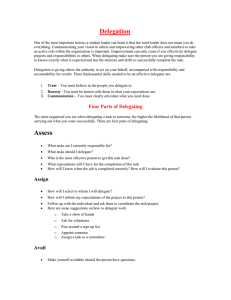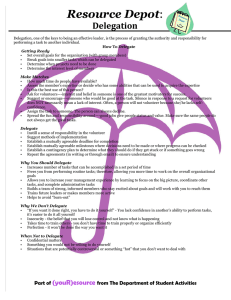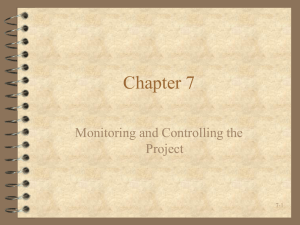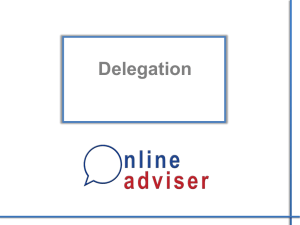Delegation - The Alternative Board
advertisement
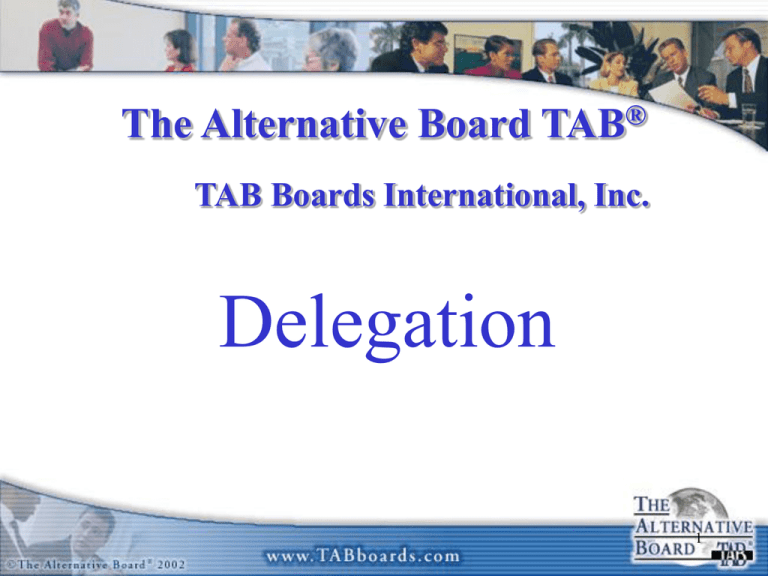
The Alternative Board TAB® TAB Boards International, Inc. Delegation 1 Delegation “Wise is the person who realizes early in life that what they can do by themselves is relatively small. A person’s success is determined, in large measures, by what they are able to get other people to do.” Lee S. Brickmore 2 Definition Appointing someone else to act on your behalf 3 Delegate To: When you reach a point in your business where you are juggling too many balls and you begin to drop them. When you want to free yourself of areas that are not your strengths or which you do not enjoy. 4 Delegate To: Deal with time management issues. When you need to create free time to strategize your business. Work on your business not just in it. Reduce the amount of time you are working, not only in hours but days. 5 Delegate To: Create growth in your company. Protect yourself in case of illness or injury. Prepare your business for an exit strategy. Reduce stress. 6 Why don’t I Delegate? The belief that “no one can do it as well as I can.” 7 Why don’t I Delegate? Your lack of confidence in employees. Your lack of desire to take risks. Reluctance to delegate tasks that you enjoy. The quest for perfection. 8 Why can’t I Delegate? Avoidance of change. Concerns about acceptance of others. Fear that the employee will do it better than you. Paranoid about sharing company systems or methods. 9 Delegation is a two-way Process You delegate responsibility; authority flows from you to the employee. Accountability flows from employee to you. 10 Levels of Authority Assign a challenge or opportunity: 1. Report facts back to me and I will make a decision on what is to be done. 2. Give me alternative actions, with pluses and minuses of each; give me a recommendation of the best option. 11 Levels of Authority Assign a challenge or opportunity : 3. Advise me of what your plan of action is; don’t take action until I authorize. 4. Advise me of your plan; proceed with the plan unless I tell you directly otherwise. 12 Levels of Authority Assign a challenge or opportunity: 5. Activate your plan and advise me of what was done. 6. Activate your plan to solve the problem and nothing is required of me. 13 Responsibility Subordinates should be accountable for their performance of delegated tasks. This can be achieved by: Evaluating performance based upon subordinates staying within authority boundaries. Measuring performances based upon achieved results. 14 Responsibility Subordinates should be accountable for their performance of delegated tasks. This can be achieved by: Scheduled updating meetings with the subordinates. Critiques, listening to subordinate and adjustments. Creation of “To Do” lists. Use of software tracking mechanisms like ACT! Or Goldmine to allow follow-up. 15 Responsibility To be successful subordinates must be given the following structure: A detailed job description A written system to be followed Training Objectives that can be measured Objectives that are achievable 16 Responsibility Subordinates to be successful must be given the following structure: Guidelines and standards of performance Timeline schedules to be followed Authority to act (Levels of authority should be pre-assigned) Incentive for performance 17 Delegating As an owner in need of help, there is a tendency to turn it over to another employee in the company abdicating the owner’s responsibility. But the employee needs to understand: Why they are doing what they are doing. What results and standards should be obtained. How their responsibilities fit into the long term plan. 18 Causes of Ineffective Delegation Employee's lack of ability due to: Poor hiring Poor or no training Employee's lack of incentive Employee's unwillingness to take risk Employee's fear of punitive action 19 Causes of Ineffective Delegation Unclear job duties Unclear task assignment Constant criticism of task results and techniques Lack of achievable goals Lack of defined objectives Over controlling the employee 20 What’s In It For Me Allow your company to grow. You can’t do it all and succeed in growth plans. Ensure you are able to run the business rather than it running you. Improve the employment culture giving your employees additional job satisfaction. Allow personal time to enjoy life. 21
